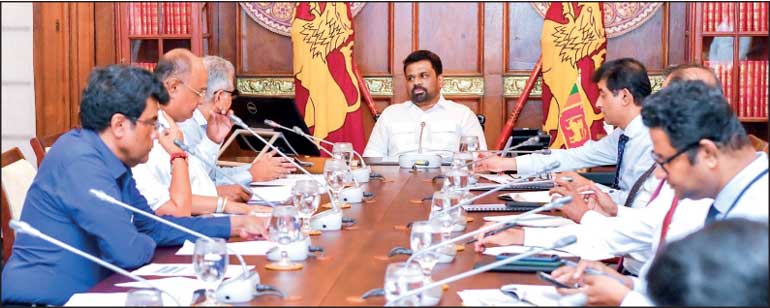Wednesday Feb 25, 2026
Wednesday Feb 25, 2026
Saturday, 13 September 2025 00:36 - - {{hitsCtrl.values.hits}}

While acknowledging the challenges confronting the apparel industry, President Anura Kumara Disanayake has said tax incentives would depend on improving fiscal revenues and economic stability but ensured the Government would direct every rupee towards productive initiatives and developing essential infrastructure required by industries and investors.
The President made these remarks while participating in a pre-Budget discussion for 2026 with apparel sector representatives from JAAF, Free Trade Zone and SME manufacturers, the President’s Media Division (PMD) said.
Disanayake emphasised that the Government’s objective was to achieve future economic growth targets based on the current stability within the country, and remains fully committed to investing in the development of essential infrastructure required by industries and investors.
By providing the necessary facilities for existing industries, it would be possible to reach the initial growth targets and the Government would ensure every rupee is directed towards the most productive investments.
Representatives from the Joint Apparel Association Forum (JAAF), the Free Trade Zone Manufacturers Association (FTZMA), as well as small and medium-scale entrepreneurs in the apparel sector, presented their budget proposals relevant to their respective areas, the PMD said.
The stakeholders also briefed the President on the new challenges and opportunities facing the apparel sector, including rising production costs. In response, the President noted that while the Government acknowledges the need for tax concessions across all sectors, such concessions will be extended in the future in line with the country’s revenue situation, ensuring that the national economy remains safeguarded.
Industry representatives expressed their appreciation to the President for the Government’s intervention that led to the reduction of tariff rates imposed on Sri Lanka by the United States under the “reciprocal tariff” system. They also extended their gratitude to the President and requested further intervention to secure additional concessions in the future.
The discussions also extensively addressed the issues currently faced by the apparel sector, as well as the steps that can be taken to effectively seize new opportunities in the global market while tackling emerging challenges. The representatives further requested the President to draw attention to these matters during upcoming official overseas visits.
The representatives also drew the President’s attention to the need for a dedicated Development Bank to support small and medium-sized enterprises, which is already a focus of the Government.
They further expressed appreciation for the Government’s digitalisation initiatives, including the development of online systems and the transition from Simplified Value Added Tax (SVAT) to Standard VAT scheme. The industry stakeholders also proposed further improvements to tax collection mechanisms, such as expanding facilities like E-Invoice.
Industry representatives stated that 55% of current production consists of value-added products and expressed confidence that this share will continue to increase in the future, trusting that the Government will develop the necessary facilities to support this growth.
Disanayake instructed officials of the Ministry of Finance to study these suggestions carefully and prepare an action plan outlining urgent measures to be taken and further discussions required, the PMD said.